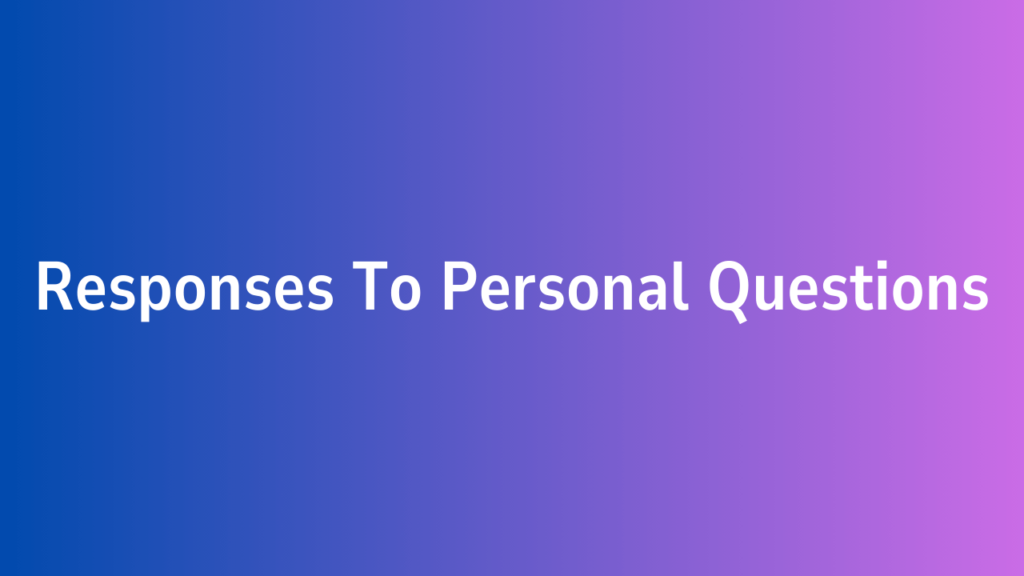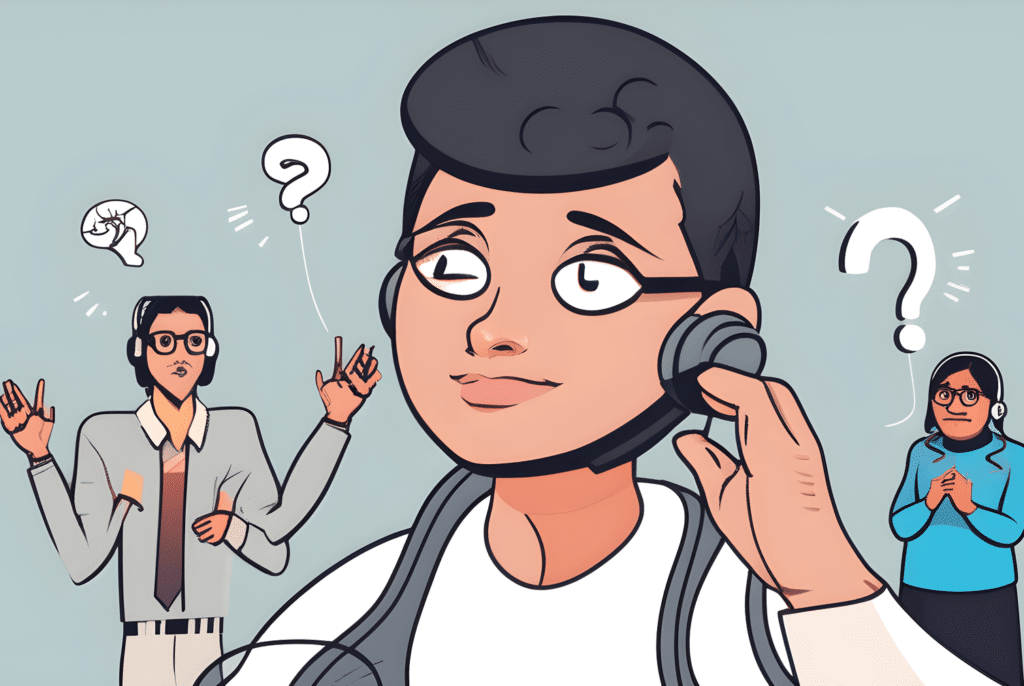Personal questions can feel like a tricky territory to navigate. Whether it’s from a friend, family member, colleague, or even a stranger, personal questions can range from casual and harmless to deeply intrusive or awkward. Knowing how to respond to such questions is an important skill that can help you maintain boundaries, preserve your privacy, and keep conversations respectful. The way you respond can also influence the flow of the conversation, the way others perceive you, and your own comfort level.
In this blog post, we’ll explore various strategies for responding to personal questions, providing examples and tips for handling different situations. We’ll also take a look at when it’s okay to give detailed answers and when you might want to keep things more general or private.
Why Personal Questions Can Be Challenging
Personal questions are inquiries that delve into topics related to your life, feelings, relationships, or experiences. These can sometimes make us feel vulnerable or uncomfortable, especially if we feel that the question crosses a boundary. Here are some reasons why personal questions can be challenging:
- Privacy Concerns: We all have a right to our privacy, and certain questions may feel too intrusive.
- Emotional Sensitivity: Some topics, such as family issues, past relationships, or personal struggles, may bring up emotions we’re not ready to discuss.
- Social Norms: The nature of personal questions can vary greatly based on cultural norms, and sometimes questions that seem casual in one culture can be considered rude in another.
- Power Dynamics: Questions from certain individuals, like a boss or authority figure, may make us feel obligated to respond, even if we don’t want to.
Knowing how to manage these situations with grace and confidence is key. Let’s dive into how you can respond to personal questions in a thoughtful and respectful manner.
General Strategies for Responding to Personal Questions
Before we explore specific examples, here are some general strategies you can use when responding to personal questions.
- Assess the Question’s Intent:
- Is the person asking out of genuine curiosity, or are they probing for information they don’t need to know? Understanding the intent behind the question will help you decide how to respond.
- Set Boundaries:
- You have every right to maintain personal boundaries. If a question makes you uncomfortable, it’s okay to let the person know without feeling guilty.
- Stay Calm and Composed:
- Sometimes, personal questions can catch us off guard. Take a deep breath and remain composed to respond confidently.
- Keep Your Answer Vague (If Needed):
- If you’re not comfortable with a question, a vague or general response can deflect the inquiry while still being polite.
- Redirect the Conversation:
- If you don’t want to answer, politely shift the conversation to a more comfortable topic.
- Be Honest (When Appropriate):
- If you feel comfortable and it’s safe to do so, answering honestly can help foster trust and strengthen relationships.
Responses to Personal Questions Based on the Situation
Let’s break down how to respond to personal questions based on different scenarios.
1. Responses to Personal Questions from Friends or Family
When friends or family ask personal questions, it’s often out of care or curiosity. However, there are times when these questions can be invasive or uncomfortable. Here’s how to handle them.
- If You Want to Answer Honestly:
- Example Question: “Why haven’t you been hanging out lately? Is something going on?”
- Response: “I’ve just been feeling a bit overwhelmed lately with work/school, but I’m doing better now. I’d love to catch up soon!”
- If the Question Is Too Personal or Intrusive:
- Example Question: “Why haven’t you gotten married yet? You’re getting older.”
- Response: “I appreciate your concern, but I’m not in a rush. I’m happy focusing on other aspects of my life right now.”
- If You Want to Keep It Light:
- Example Question: “Are you dating anyone?”
- Response: “I’m not seeing anyone right now. But I’ll let you know if that changes!”
- If You’re Not Comfortable Answering:
- Example Question: “How much money do you make?”
- Response: “I prefer to keep that kind of information private, but I’m doing well, thank you for asking!”
These examples show that you can maintain your boundaries while still being polite and respectful in your responses.
2. Responses to Personal Questions from Colleagues or Bosses
In a professional setting, personal questions can be tricky. Often, these types of questions are asked out of casual interest or to build rapport, but it’s important to maintain professionalism while being courteous.
- If You Want to Answer Politely:
- Example Question: “How was your weekend?”
- Response: “It was great! I had a chance to relax and recharge. How about you?”
- If the Question Feels Too Personal:
- Example Question: “Do you have kids?”
- Response: “I prefer to keep my personal life private, but thank you for asking!”
- If You Don’t Want to Share Details:
- Example Question: “Why did you leave your last job?”
- Response: “I’m happy to share more about that in a professional context, but it’s not something I discuss in detail here.”
- If You Feel the Question is Unnecessary:
- Example Question: “What do you and your partner do on weekends?”
- Response: “We like to keep our weekends low-key, just spending time together and relaxing. What do you like to do?”
By maintaining a polite tone while setting boundaries, you can answer personal questions from colleagues and bosses without compromising your comfort.
3. Responses to Personal Questions from Acquaintances or Strangers
Questions from acquaintances or strangers can feel even more invasive since there is typically no established relationship. When you don’t want to share personal details, it’s important to respond gracefully without making the person feel uncomfortable.
- If You Want to Be Polite but Vague:
- Example Question: “Where do you live?”
- Response: “I live in [neighborhood or city], but I like to keep the specifics private.”
- If the Question Is Too Personal:
- Example Question: “How much did you pay for that?”
- Response: “I prefer not to talk about money, but I’m happy with my purchase.”
- If You Don’t Want to Answer:
- Example Question: “Are you married?”
- Response: “I’m not married, but I appreciate your curiosity.”
In these cases, it’s key to remain polite while keeping the conversation professional or neutral. You can redirect the focus to something more comfortable.
4. Handling Personal Questions about Sensitive Topics
Sometimes, personal questions can touch on sensitive topics like mental health, past trauma, or family issues. Here’s how to navigate these delicate situations.
- If You Don’t Want to Share:
- Example Question: “Why are you always so quiet? Is everything okay?”
- Response: “I’m doing alright, just need some time to recharge. Thanks for asking, though.”
- If the Question Is About Mental Health:
- Example Question: “Are you seeing a therapist?”
- Response: “I take care of my mental health in the way that works best for me, but I prefer to keep that private.”
- If the Question is About Family Issues:
- Example Question: “Why do you guys never hang out together as a family?”
- Response: “We all have our own busy schedules, but we’re doing fine.”
These situations require a balance between protecting your privacy and respecting the other person’s concern. It’s okay to let them know that you appreciate their care, but you are not ready to discuss personal matters.
Table: Responses for Different Types of Personal Questions
Here’s a table summarizing how to respond to personal questions in various scenarios.
| Type of Personal Question | Possible Responses |
|---|---|
| From Friends or Family | – “I’ve just been busy lately, but I’m doing well.” – “I prefer not to share that right now, but thanks for asking!” |
| From Colleagues or Bosses | – “I had a quiet weekend. What about you?” – “I like to keep my personal life private, but I’m happy to chat about work!” |
| From Acquaintances or Strangers | – “I prefer not to answer that, but thank you for your interest!” – “I like to keep those details private.” |
| Sensitive Topics (Mental Health, Family Issues) | – “I’m doing well, thank you for your concern.” – “I’d rather not get into that, but I appreciate you checking in.” |
Key Points to Keep in Mind
- You Have the Right to Set Boundaries: You don’t have to answer every personal question, especially if it makes you uncomfortable.
- It’s Okay to Be Vague: If you’re not ready to share, keep your answer brief and non-specific.
- Use Humor to Deflect: If appropriate, using humor can help lighten the conversation and deflect personal questions without causing tension.
- Stay Calm: Whether you’re feeling uncomfortable or surprised, staying calm and composed is key to responding effectively.
- Be Honest When You Feel Comfortable: Honesty can help build trust in relationships, but it’s important to gauge the context before opening up.
Conclusion: Mastering the Art of Responding to Personal Questions
Responding to personal questions doesn’t have to be stressful. Whether you’re faced with casual questions from friends, probing inquiries from colleagues, or sensitive topics from acquaintances, the key is to be mindful of your comfort level and personal boundaries. By using the strategies outlined above, you can handle any personal question with confidence and grace. The goal is to maintain your privacy while still being respectful and considerate of the other person’s interest or concern.
Remember, you control the conversation and how much of your personal life you want to share. Stay true to yourself, and you’ll always know how to respond in a way that feels right for you.



